【ASP.NET Core分布式项目实战】(三)整理IdentityServer4 MVC授权、Consent功能实现
前言
由于之前的博客都是基于其他的博客进行开发,现在重新整理一下方便以后后期使用与学习
新建IdentityServer4服务端
服务端也就是提供服务,如QQ Weibo等。
新建项目解决方案AuthSample.
新建一个ASP.NET Core Web Application 项目MvcCookieAuthSample,选择模板Web 应用程序 不进行身份验证。
给网站设置默认地址 http://localhost:5000

第一步:添加Nuget包:IdentityServer4
添加IdentityServer4 引用:
Install-Package IdentityServer4
第二步:添加Config.cs配置类
然后添加配置类Config.cs:
using System;
using System.Collections.Generic;
using System.Linq;
using System.Threading.Tasks;
using IdentityServer4;
using IdentityServer4.Models;
using IdentityServer4.Test; namespace MvcCookieAuthSample
{
public class Config
{
//所有可以访问的Resource
public static IEnumerable<ApiResource> GetApiResources()
{
return new List<ApiResource>()
{
new ApiResource("api1","API Application")
};
} //客户端
public static IEnumerable<Client> GetClients()
{
return new List<Client>
{
new Client{
ClientId="mvc",
AllowedGrantTypes=GrantTypes.Implicit,//模式:隐式模式
ClientSecrets={//私钥
new Secret("secret".Sha256())
},
AllowedScopes={//运行访问的资源
IdentityServerConstants.StandardScopes.Profile,
IdentityServerConstants.StandardScopes.OpenId,
},
RedirectUris={"http://localhost:5001/signin-oidc"},//跳转登录到的客户端的地址
PostLogoutRedirectUris={"http://localhost:5001/signout-callback-oidc"},//跳转登出到的客户端的地址
RequireConsent=false//是否需要用户点击确认进行跳转
}
};
} //测试用户
public static List<TestUser> GetTestUsers()
{
return new List<TestUser>
{
new TestUser{
SubjectId="",
Username="wyt",
Password="password"
}
};
} //定义系统中的资源
public static IEnumerable<IdentityResource> GetIdentityResources()
{
return new List<IdentityResource>
{
//这里实际是claims的返回资源
new IdentityResources.OpenId(),
new IdentityResources.Profile(),
new IdentityResources.Email()
};
} }
}
第三步:添加Startup配置
引用命名空间:
using IdentityServer4;
然后打开Startup.cs 加入如下:
services.AddIdentityServer()
.AddDeveloperSigningCredential()//添加开发人员签名凭据
.AddInMemoryApiResources(Config.GetApiResources())//添加内存apiresource
.AddInMemoryClients(Config.GetClients())//添加内存client
.AddInMemoryIdentityResources(Config.GetIdentityResources())//添加系统中的资源
.AddTestUsers(Config.GetTestUsers());//添加测试用户
public void Configure(IApplicationBuilder app, IHostingEnvironment env)
{
...
app.UseIdentityServer();
...
}
注册登录实现
我们还需要新建一个ViewModels,在ViewModels中新建RegisterViewModel.cs和LoginViewModel.cs来接收表单提交的值以及来进行强类型视图
using System.ComponentModel.DataAnnotations; namespace MvcCookieAuthSample.ViewModels
{
public class RegisterViewModel
{
[Required]//必须的
[DataType(DataType.EmailAddress)]//内容检查是否为邮箱
public string Email { get; set; } [Required]//必须的
[DataType(DataType.Password)]//内容检查是否为密码
public string Password { get; set; } [Required]//必须的
[DataType(DataType.Password)]//内容检查是否为密码
public string ConfirmedPassword { get; set; }
}
}
using System;
using System.Collections.Generic;
using System.ComponentModel.DataAnnotations;
using System.Linq;
using System.Threading.Tasks; namespace MvcCookieAuthSample.ViewModels
{
public class LoginViewModel
{ [Required]
public string UserName { get; set; } [Required]//必须的
[DataType(DataType.Password)]//内容检查是否为密码
public string Password { get; set; }
}
}
在Controllers文件夹下新建AdminController.cs
using System;
using System.Collections.Generic;
using System.Linq;
using System.Threading.Tasks;
using Microsoft.AspNetCore.Mvc; namespace MvcCookieAuthSample.Controllers
{
public class AdminController : Controller
{
public IActionResult Index()
{
return View();
}
}
}
在Views文件夹下新建Admin文件夹,并在Admin文件夹下新建Index.cshtml
@{
ViewData["Title"] = "Admin";
}
<h2>@ViewData["Title"]</h2>
<p>Admin Page</p>
在Controllers文件夹下新建AccountController.cs
using System;
using System.Collections.Generic;
using System.Linq;
using System.Threading.Tasks;
using Microsoft.AspNetCore.Mvc;
using IdentityServer4.Test;
using Microsoft.AspNetCore.Identity;
using MvcCookieAuthSample.ViewModels;
using Microsoft.AspNetCore.Authentication; namespace MvcCookieAuthSample.Controllers
{
public class AccountController : Controller
{
private readonly TestUserStore _users;
public AccountController(TestUserStore users)
{
_users = users;
} //内部跳转
private IActionResult RedirectToLocal(string returnUrl)
{
if (Url.IsLocalUrl(returnUrl))
{//如果是本地
return Redirect(returnUrl);
} return RedirectToAction(nameof(HomeController.Index), "Home");
} //添加验证错误
private void AddError(IdentityResult result)
{
//遍历所有的验证错误
foreach (var error in result.Errors)
{
//返回error到model
ModelState.AddModelError(string.Empty, error.Description);
}
} public IActionResult Register(string returnUrl = null)
{
ViewData["returnUrl"] = returnUrl;
return View();
} [HttpPost]
public async Task<IActionResult> Register(RegisterViewModel registerViewModel, string returnUrl = null)
{
return View();
} public IActionResult Login(string returnUrl = null)
{
ViewData["returnUrl"] = returnUrl;
return View();
} [HttpPost]
public async Task<IActionResult> Login(LoginViewModel loginViewModel, string returnUrl = null)
{
if (ModelState.IsValid)
{
ViewData["returnUrl"] = returnUrl;
var user = _users.FindByUsername(loginViewModel.UserName); if (user==null)
{
ModelState.AddModelError(nameof(loginViewModel.UserName), "UserName not exists");
}
else
{
if (_users.ValidateCredentials(loginViewModel.UserName,loginViewModel.Password))
{
//是否记住
var prop = new AuthenticationProperties
{
IsPersistent = true,
ExpiresUtc = DateTimeOffset.UtcNow.Add(TimeSpan.FromMinutes())
}; await Microsoft.AspNetCore.Http.AuthenticationManagerExtensions.SignInAsync(HttpContext, user.SubjectId, user.Username, prop);
}
} return RedirectToLocal(returnUrl);
} return View();
} public async Task<IActionResult> Logout()
{
await HttpContext.SignOutAsync();
return RedirectToAction("Index", "Home");
}
}
}
然后在Views文件夹下新增Account文件夹并新增Register.cshtml与Login.cshtml视图
@{
ViewData["Title"] = "Register";
}
@using MvcCookieAuthSample.ViewModels;
@model RegisterViewModel;
<h2>@ViewData["Title"]</h2>
<h3>@ViewData["Message"]</h3>
<div class="row">
<div class="col-md-4">
@* 这里将asp-route-returnUrl="@ViewData["returnUrl"],就可以在进行register的post请求的时候接收到returnUrl *@
<form method="post" asp-route-returnUrl="@ViewData["returnUrl"]">
<h4>Create a new account.</h4>
<hr />
@*统一显示错误信息*@
<div class="text-danger" asp-validation-summary="All"></div>
<div class="form-group">
<label asp-for="Email"></label>
<input asp-for="Email" class="form-control" />
<span asp-validation-for="Email" class="text-danger"></span>
</div>
<div class="form-group">
<label asp-for="Password"></label>
<input asp-for="Password" class="form-control" />
<span asp-validation-for="Password" class="text-danger"></span>
</div>
<div class="form-group">
<label asp-for="ConfirmedPassword"></label>
<input asp-for="ConfirmedPassword" class="form-control" />
<span asp-validation-for="ConfirmedPassword" class="text-danger"></span>
</div>
<button type="submit" class="btn btn-default">Register</button>
</form>
</div>
</div>
@{
ViewData["Title"] = "Login";
}
@using MvcCookieAuthSample.ViewModels;
@model LoginViewModel;
<div class="row">
<div class="col-md-4">
<section>
<form method="post" asp-controller="Account" asp-action="Login" asp-route-returnUrl="@ViewData["returnUrl"]">
<h4>Use a local account to log in.</h4>
<hr />
@*统一显示错误信息*@
<div class="text-danger" asp-validation-summary="All"></div>
<div class="form-group">
<label asp-for="UserName"></label>
<input asp-for="UserName" class="form-control" />
<span asp-validation-for="UserName" class="text-danger"></span>
</div>
<div class="form-group">
<label asp-for="Password"></label>
<input asp-for="Password" type="password" class="form-control" />
<span asp-validation-for="Password" class="text-danger"></span>
</div>
<div class="form-group">
<button type="submit" class="btn btn-default">Log in</button>
</div>
</form>
</section>
</div>
</div>
@section Scripts
{
@await Html.PartialAsync("_ValidationScriptsPartial")
}
我们接下来要修改_Layout.cshtml视图页面判断注册/登陆按钮是否应该隐藏
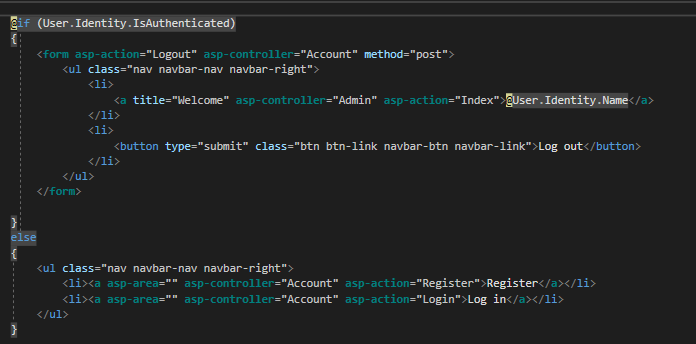
完整的_Layout.cshtml代码:
<!DOCTYPE html>
<html>
<head>
<meta charset="utf-8" />
<meta name="viewport" content="width=device-width, initial-scale=1.0" />
<title>@ViewData["Title"] - MvcCookieAuthSample</title> <environment include="Development">
<link rel="stylesheet" href="~/lib/bootstrap/dist/css/bootstrap.css" />
<link rel="stylesheet" href="~/css/site.css" />
</environment>
<environment exclude="Development">
<link rel="stylesheet" href="https://ajax.aspnetcdn.com/ajax/bootstrap/3.3.7/css/bootstrap.min.css"
asp-fallback-href="~/lib/bootstrap/dist/css/bootstrap.min.css"
asp-fallback-test-class="sr-only" asp-fallback-test-property="position" asp-fallback-test-value="absolute" />
<link rel="stylesheet" href="~/css/site.min.css" asp-append-version="true" />
</environment>
</head>
<body>
<nav class="navbar navbar-inverse navbar-fixed-top">
<div class="container">
<div class="navbar-header">
<button type="button" class="navbar-toggle" data-toggle="collapse" data-target=".navbar-collapse">
<span class="sr-only">Toggle navigation</span>
<span class="icon-bar"></span>
<span class="icon-bar"></span>
<span class="icon-bar"></span>
</button>
<a asp-area="" asp-controller="Home" asp-action="Index" class="navbar-brand">MvcCookieAuthSample</a>
</div>
<div class="navbar-collapse collapse">
<ul class="nav navbar-nav">
<li><a asp-area="" asp-controller="Home" asp-action="Index">Home</a></li>
<li><a asp-area="" asp-controller="Home" asp-action="About">About</a></li>
<li><a asp-area="" asp-controller="Home" asp-action="Contact">Contact</a></li>
</ul> @if (User.Identity.IsAuthenticated)
{
<form asp-action="Logout" asp-controller="Account" method="post">
<ul class="nav navbar-nav navbar-right">
<li>
<a title="Welcome" asp-controller="Admin" asp-action="Index">@User.Identity.Name</a>
</li>
<li>
<button type="submit" class="btn btn-link navbar-btn navbar-link">Log out</button>
</li>
</ul>
</form> }
else
{
<ul class="nav navbar-nav navbar-right">
<li><a asp-area="" asp-controller="Account" asp-action="Register">Register</a></li>
<li><a asp-area="" asp-controller="Account" asp-action="Login">Log in</a></li>
</ul>
} </div>
</div>
</nav>
<div class="container body-content">
@RenderBody()
<hr />
<footer>
<p>© - MvcCookieAuthSample</p>
</footer>
</div> <environment include="Development">
<script src="~/lib/jquery/dist/jquery.js"></script>
<script src="~/lib/bootstrap/dist/js/bootstrap.js"></script>
<script src="~/js/site.js" asp-append-version="true"></script>
</environment>
<environment exclude="Development">
<script src="https://ajax.aspnetcdn.com/ajax/jquery/jquery-2.2.0.min.js"
asp-fallback-src="~/lib/jquery/dist/jquery.min.js"
asp-fallback-test="window.jQuery"
crossorigin="anonymous"
integrity="sha384-K+ctZQ+LL8q6tP7I94W+qzQsfRV2a+AfHIi9k8z8l9ggpc8X+Ytst4yBo/hH+8Fk">
</script>
<script src="https://ajax.aspnetcdn.com/ajax/bootstrap/3.3.7/bootstrap.min.js"
asp-fallback-src="~/lib/bootstrap/dist/js/bootstrap.min.js"
asp-fallback-test="window.jQuery && window.jQuery.fn && window.jQuery.fn.modal"
crossorigin="anonymous"
integrity="sha384-Tc5IQib027qvyjSMfHjOMaLkfuWVxZxUPnCJA7l2mCWNIpG9mGCD8wGNIcPD7Txa">
</script>
<script src="~/js/site.min.js" asp-append-version="true"></script>
</environment> @RenderSection("Scripts", required: false)
</body>
</html>
最后给AdminController加上 [Authorize] 特性标签即可
然后我们就可以运行网站,输入用户名和密码进行登录了
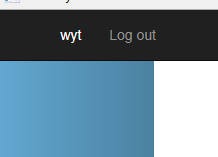
新建客户端
新建一个MVC网站MvcClient
dotnet new mvc --name MvcClient
给网站设置默认地址 http://localhost:5001

MVC的网站已经内置帮我们实现了Identity,所以我们不需要再额外添加Identity引用
添加认证
services.AddAuthentication(options =>
{
options.DefaultScheme = "Cookies";//使用Cookies认证
options.DefaultChallengeScheme = "oidc";//使用oidc
})
.AddCookie("Cookies")//配置Cookies认证
.AddOpenIdConnect("oidc",options=> {//配置oidc
options.SignInScheme = "Cookies";
options.Authority = "http://localhost:5000";
options.RequireHttpsMetadata = false; options.ClientId = "mvc";
options.ClientSecret = "secret";
options.SaveTokens = true;
});
在管道中使用Authentication
app.UseAuthentication();
接下来我们在HomeController上打上 [Authorize] 标签,然后启动运行
我们这个时候访问首页http://localhost:5001会自动跳转到ocalhost:5000/account/login登录

登录之后会自动跳转回来

我们可以在Home/About页面将claim的信息显示出来
@{
ViewData["Title"] = "About";
}
<h2>@ViewData["Title"]</h2>
<h3>@ViewData["Message"]</h3>
<dl>
@foreach (var claim in User.Claims)
{
<dt>@claim.Type</dt>
<dt>@claim.Value</dt>
}
</dl>
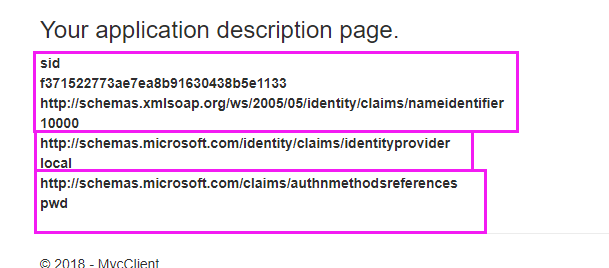
这边的内容是根据我们在IdentityServer服务中定义的返回资源决定的

Consent功能实现
首先在ViewModels文件夹下创建两个视图模型
ScopeViewModel.cs
using System;
using System.Collections.Generic;
using System.Linq;
using System.Threading.Tasks; namespace MvcCookieAuthSample.ViewModels
{
//领域
public class ScopeViewModel
{
public string Name { get; set; }
public string DisplayName { get; set; }
public string Description { get; set; }
public bool Emphasize { get; set; }
public bool Required { get; set; }
public bool Checked { get; set; }
}
}
ConsentViewModel.cs
using System;
using System.Collections.Generic;
using System.Linq;
using System.Threading.Tasks; namespace MvcCookieAuthSample.ViewModels
{
public class ConsentViewModel
{
public string ClientId { get; set; }
public string ClientName { get; set; }
public string ClientUrl { get; set; }
public string ClientLogoUrl { get; set; }
public bool AllowRememberConsent { get; set; } public IEnumerable<ScopeViewModel> IdentityScopes { get; set; }
public IEnumerable<ScopeViewModel> ResourceScopes { get; set; }
}
}
我们在MvcCookieAuthSample项目中添加新控制器ConsentController
using System;
using System.Collections.Generic;
using System.Linq;
using System.Threading.Tasks;
using Microsoft.AspNetCore.Mvc;
using MvcCookieAuthSample.ViewModels;
using IdentityServer4.Models;
using IdentityServer4.Services;
using IdentityServer4.Stores; namespace MvcCookieAuthSample.Controllers
{
public class ConsentController : Controller
{
private readonly IClientStore _clientStore;
private readonly IResourceStore _resourceStore;
private readonly IIdentityServerInteractionService _identityServerInteractionService; public ConsentController(IClientStore clientStore, IResourceStore resourceStore, IIdentityServerInteractionService identityServerInteractionService)
{
_clientStore = clientStore;
_resourceStore = resourceStore;
_identityServerInteractionService = identityServerInteractionService;
} private async Task<ConsentViewModel> BuildConsentViewModel(string returnUrl)
{
var request =await _identityServerInteractionService.GetAuthorizationContextAsync(returnUrl);
if (request == null)
return null; var client =await _clientStore.FindEnabledClientByIdAsync(request.ClientId);
var resources =await _resourceStore.FindEnabledResourcesByScopeAsync(request.ScopesRequested); return CreateConsentViewModel(request, client, resources);
} private ConsentViewModel CreateConsentViewModel(AuthorizationRequest request,Client client,Resources resources)
{
var vm = new ConsentViewModel();
vm.ClientName = client.ClientName;
vm.ClientLogoUrl = client.LogoUri;
vm.ClientUrl = client.ClientUri;
vm.AllowRememberConsent = client.AllowRememberConsent; vm.IdentityScopes = resources.IdentityResources.Select(i => CreateScopeViewModel(i));
vm.ResourceScopes = resources.ApiResources.SelectMany(i =>i.Scopes).Select(i=>CreateScopeViewModel(i)); return vm;
} private ScopeViewModel CreateScopeViewModel(IdentityResource identityResource)
{
return new ScopeViewModel
{
Name = identityResource.Name,
DisplayName = identityResource.DisplayName,
Description = identityResource.Description,
Required = identityResource.Required,
Checked = identityResource.Required,
Emphasize = identityResource.Emphasize
};
} private ScopeViewModel CreateScopeViewModel(Scope scope)
{
return new ScopeViewModel
{
Name = scope.Name,
DisplayName = scope.DisplayName,
Description = scope.Description,
Required = scope.Required,
Checked = scope.Required,
Emphasize = scope.Emphasize
};
} [HttpGet]
public async Task<IActionResult> Index(string returnUrl)
{
var model =await BuildConsentViewModel(returnUrl);
if (model==null)
{ }
return View(model);
}
}
}
然后新建Idenx.cshtml视图和_ScopeListitem.cshtml分部视图
_ScopeListitem.cshtml
@using MvcCookieAuthSample.ViewModels;
@model ScopeViewModel <li>
<label>
<input type="checkbox" name="ScopesConsented" id="scopes_@Model.Name" value="@Model.Name" checked="@Model.Checked" disabled="@Model.Required"/> <strong>@Model.Name</strong>
@if (Model.Emphasize)
{
<span class="glyphicon glyphicon-exclamation-sign"></span>
}
</label>
@if (string.IsNullOrWhiteSpace(Model.Description))
{
<div>
<label for="scopes_@Model.Name">@Model.Description</label>
</div>
}
</li>
Idenx.cshtml
@using MvcCookieAuthSample.ViewModels;
@model ConsentViewModel
<p>Consent Page</p>
<!--Client Info-->
<div class="row page-header">
<div class="col-sm-10">
@if (!string.IsNullOrWhiteSpace(Model.ClientLogoUrl))
{
<div><img src="@Model.ClientLogoUrl" /></div>
} <h1>
@Model.ClientName
<small>希望使用你的账户</small>
</h1>
</div>
</div> <!--Scope Info-->
<div class="row">
<div class="col-sm-8">
<form asp-action="Index">
@if (Model.IdentityScopes.Any())
{
<div>
<div class="panel-heading">
<span class="glyphicon glyphicon-user"></span>
用户信息
</div>
<ul class="list-group">
@foreach (var scope in Model.IdentityScopes)
{
@Html.Partial("_ScopeListitem",scope)
}
</ul>
</div>
}
@if (Model.ResourceScopes.Any())
{
<div>
<div class="panel-heading">
<span class="glyphicon glyphicon-tasks"></span>
应用权限
</div>
<ul class="list-group">
@foreach (var scope in Model.ResourceScopes)
{
@Html.Partial("_ScopeListitem",scope)
}
</ul>
</div>
}
</form>
</div>
</div>
最后我们修改Config.cs,增加一些信息
using System;
using System.Collections.Generic;
using System.Linq;
using System.Threading.Tasks;
using IdentityServer4;
using IdentityServer4.Models;
using IdentityServer4.Test; namespace MvcCookieAuthSample
{
public class Config
{
//所有可以访问的Resource
public static IEnumerable<ApiResource> GetApiResources()
{
return new List<ApiResource>()
{
new ApiResource("api1","API Application")
};
} //客户端
public static IEnumerable<Client> GetClients()
{
return new List<Client>
{
new Client{
ClientId="mvc",
AllowedGrantTypes=GrantTypes.Implicit,//模式:隐式模式
ClientSecrets={//私钥
new Secret("secret".Sha256())
},
AllowedScopes={//运行访问的资源
IdentityServerConstants.StandardScopes.Profile,
IdentityServerConstants.StandardScopes.OpenId,
IdentityServerConstants.StandardScopes.Email,
},
RedirectUris={"http://localhost:5001/signin-oidc"},//跳转登录到的客户端的地址
PostLogoutRedirectUris={"http://localhost:5001/signout-callback-oidc"},//跳转登出到的客户端的地址
RequireConsent=true,//是否需要用户点击确认进行跳转,改为点击确认后进行跳转 ClientName="MVC Clent",
ClientUri="http://localhost:5001",
LogoUri="https://chocolatey.org/content/packageimages/aspnetcore-runtimepackagestore.2.0.0.png",
AllowRememberConsent=true,
}
};
} //测试用户
public static List<TestUser> GetTestUsers()
{
return new List<TestUser>
{
new TestUser{
SubjectId="",
Username="wyt",
Password="password", }
};
} //定义系统中的资源
public static IEnumerable<IdentityResource> GetIdentityResources()
{
return new List<IdentityResource>
{
//这里实际是claims的返回资源
new IdentityResources.OpenId(),
new IdentityResources.Profile(),
new IdentityResources.Email()
};
} }
}
我们这个时候访问首页http://localhost:5001会自动跳转到ocalhost:5000/account/login登录

登录之后会自动跳转到登录确认页面
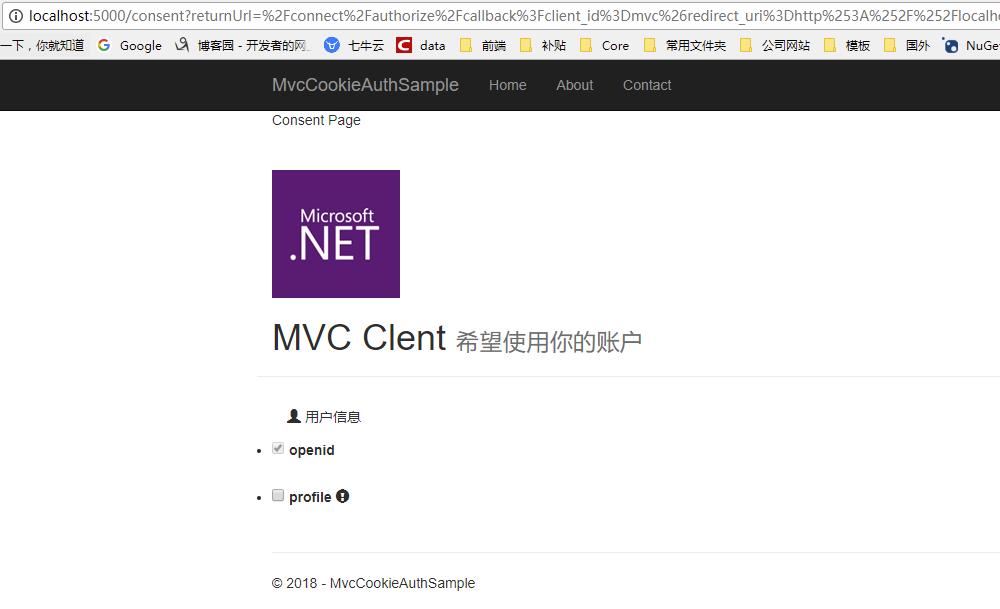
Consent 确认逻辑实现
首先我们在 ViewModels 文件夹中增加一个类 InputConsentViewModel.cs 用于接收 Consent/Index.cshtml 提交的表单信息
public class InputConsentViewModel
{
/// <summary>
/// 按钮
/// </summary>
public string Button { get; set; }
/// <summary>
/// 接收到的勾选的Scope
/// </summary>
public IEnumerable<string> ScopesConsented { get; set; }
/// <summary>
/// 是否选择记住
/// </summary>
public bool RememberConsent { get; set; }
/// <summary>
/// 跳转地址
/// </summary>
public string ReturnUrl { get; set; }
}
然后修改 ConsentViewModel.cs ,加入ReturnUrl
public class ConsentViewModel
{
public string ClientId { get; set; }
public string ClientName { get; set; }
public string ClientUrl { get; set; }
public string ClientLogoUrl { get; set; }
public bool AllowRememberConsent { get; set; } public IEnumerable<ScopeViewModel> IdentityScopes { get; set; }
public IEnumerable<ScopeViewModel> ResourceScopes { get; set; } public string ReturnUrl { get; set; }
}
然后修改 Consent\Index.cshtml ,加入ReturnUrl

然后修改 Controllers\ConsentController.cs 中的 BuildConsentViewModel 方法
private async Task<ConsentViewModel> BuildConsentViewModel(string returnUrl)
{
AuthorizationRequest request = await _identityServerInteractionService.GetAuthorizationContextAsync(returnUrl);
if (request == null)
{
return null;
} Client client = await _clientStore.FindEnabledClientByIdAsync(request.ClientId);
Resources resources = await _resourceStore.FindEnabledResourcesByScopeAsync(request.ScopesRequested); var vm= CreateConsentViewModel(request, client, resources);
vm.ReturnUrl = returnUrl;
return vm;
}
然后在 Controllers\ConsentController.cs 中添加action
[HttpPost]
public async Task<IActionResult> Index(InputConsentViewModel viewModel)
{
ConsentResponse consentResponse=null;
if (viewModel.Button == "no")
{
consentResponse= ConsentResponse.Denied;
}
else if (viewModel.Button == "yes")
{
if (viewModel.ScopesConsented!=null&&viewModel.ScopesConsented.Any())
{
consentResponse = new ConsentResponse()
{
RememberConsent = viewModel.RememberConsent,
ScopesConsented = viewModel.ScopesConsented
};
}
} if ( consentResponse!=null)
{
var request =await _identityServerInteractionService.GetAuthorizationContextAsync(viewModel.ReturnUrl);
await _identityServerInteractionService.GrantConsentAsync(request, consentResponse);
return Redirect(viewModel.ReturnUrl);
} var model = await BuildConsentViewModel(viewModel.ReturnUrl);
if (model == null)
{ } return View(model);
}
然后将 ViewModels\ConsentViewModel.cs 中 ConsentViewModel 的 AllowRememberConsent 改为 RememberConsent ,这样才能与 ViewModels\InputConsentViewModel.cs 保持一致
public class ConsentViewModel:InputConsentViewModel
{
public string ClientId { get; set; }
public string ClientName { get; set; }
public string ClientUrl { get; set; }
public string ClientLogoUrl { get; set; }
//public bool RememberConsent { get; set; }
public IEnumerable<ScopeViewModel> IdentityScopes { get; set; }
public IEnumerable<ScopeViewModel> ResourceScopes { get; set; }
//public string ReturnUrl { get; set; }
}
最后修改视图 Consent\Index.cshtml ,加入记住选项和确认按钮
@using MvcCookieAuthSample.ViewModels;
@model ConsentViewModel
<p>Consent Page</p>
<!--Client Info-->
<div class="row page-header">
<div class="col-sm-10">
@if (!string.IsNullOrWhiteSpace(Model.ClientLogoUrl))
{
<div><img src="@Model.ClientLogoUrl" /></div>
} <h1>
@Model.ClientId
<small>希望使用您的账户</small>
</h1>
</div>
</div> <!--Scope Info-->
<div class="row">
<div class="col-sm-8">
<form asp-action="Index" method="post">
<input type="hidden" asp-for="ReturnUrl"/>
@if (Model.IdentityScopes.Any())
{
<div>
<div class="panel-heading">
<span class="glyphicon glyphicon-user"></span>
用户信息
</div>
<ul class="list-group">
@foreach (var scope in Model.IdentityScopes)
{
@Html.Partial("_ScopeListitem", scope)
}
</ul>
</div>
}
@if (Model.ResourceScopes.Any())
{
<div>
<div class="panel-heading">
<span class="glyphicon glyphicon-tasks"></span>
应用权限
</div>
<ul class="list-group">
@foreach (var scope in Model.ResourceScopes)
{
@Html.Partial("_ScopeListitem", scope)
}
</ul>
</div>
} <div>
<label>
<input type="checkbox" asp-for="RememberConsent"/>
<strong>记住我的选择</strong>
</label>
</div> <div>
<button name="button" value="yes" class="btn btn-primary" autofocus>同意</button>
<button name="button" value="no" >取消</button>
@if (!string.IsNullOrEmpty(Model.ClientUrl))
{
<a href="@Model.ClientUrl" class="pull-right btn btn-default">
<span class="glyphicon glyphicon-info-sign"></span>
<strong>@Model.ClientUrl</strong>
</a>
}
</div>
</form>
</div>
</div>
修改视图 Views\Consent\_ScopeListitem.cshtml
@using MvcCookieAuthSample.ViewModels;
@model ScopeViewModel <li>
<label>
<input type="checkbox" name="ScopesConsented" id="scopes_@Model.Name" value="@Model.Name" checked="@Model.Checked" disabled="@Model.Required"/>
@if (Model.Required)
{
<input type="hidden" name="ScopesConsented" value="@Model.Name"/>
} <strong>@Model.Name</strong>
@if (Model.Emphasize)
{
<span class="glyphicon glyphicon-exclamation-sign"></span>
}
</label> @if (!string.IsNullOrWhiteSpace(Model.Description))
{
<div>
<label for="scopes_@Model.Name">@Model.Description</label>
</div>
} </li>
运行效果
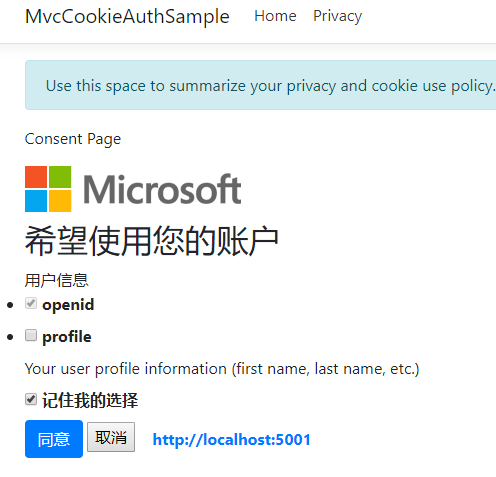
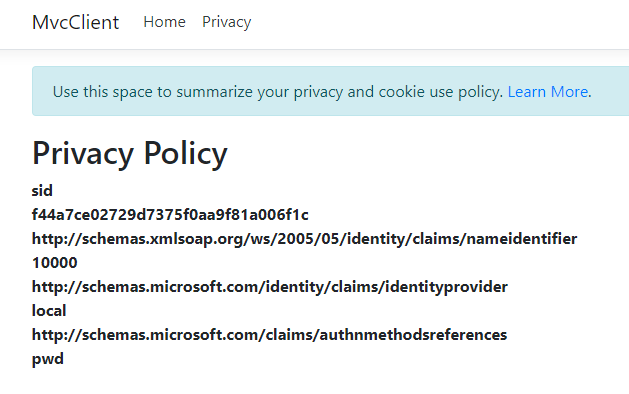
Asp.Net Core2.2源码:链接: https://pan.baidu.com/s/1pndxJwqpTsHmNmfQsQ0_2w 提取码: jxwd
Consent 代码重构
新建 Services 文件夹,添加 ConsentService.cs 用于业务封装
public class ConsentService
{
private readonly IClientStore _clientStore;
private readonly IResourceStore _resourceStore;
private readonly IIdentityServerInteractionService _identityServerInteractionService; public ConsentService(IClientStore clientStore
, IResourceStore resourceStore
, IIdentityServerInteractionService identityServerInteractionService)
{
_clientStore = clientStore;
_resourceStore = resourceStore;
_identityServerInteractionService = identityServerInteractionService;
} public async Task<ConsentViewModel> BuildConsentViewModel(string returnUrl,InputConsentViewModel model=null)
{
AuthorizationRequest request = await _identityServerInteractionService.GetAuthorizationContextAsync(returnUrl);
if (request == null)
{
return null;
} Client client = await _clientStore.FindEnabledClientByIdAsync(request.ClientId);
Resources resources = await _resourceStore.FindEnabledResourcesByScopeAsync(request.ScopesRequested); var vm = CreateConsentViewModel(request, client, resources,model);
vm.ReturnUrl = returnUrl;
return vm;
} public async Task<ProcessConsentResult> ProcessConsent(InputConsentViewModel model)
{
ConsentResponse consentResponse = null;
var result=new ProcessConsentResult();
if (model.Button == "no")
{
consentResponse = ConsentResponse.Denied;
}
else if (model.Button == "yes")
{
if (model.ScopesConsented != null && model.ScopesConsented.Any())
{
consentResponse = new ConsentResponse()
{
RememberConsent = model.RememberConsent,
ScopesConsented = model.ScopesConsented
};
}
else
{
result.ValidationError = "请至少选择一个权限";
}
} if (consentResponse != null)
{
var request = await _identityServerInteractionService.GetAuthorizationContextAsync(model.ReturnUrl);
await _identityServerInteractionService.GrantConsentAsync(request, consentResponse);
result.RedirectUrl = model.ReturnUrl;
}
else
{
ConsentViewModel consentViewModel = await BuildConsentViewModel(model.ReturnUrl,model);
result.ViewModel = consentViewModel;
} return result;
} #region Private Methods private ConsentViewModel CreateConsentViewModel(AuthorizationRequest request, Client client,
Resources resources,InputConsentViewModel model)
{
var rememberConsent = model?.RememberConsent ?? true;
var selectedScopes = model?.ScopesConsented ?? Enumerable.Empty<string>(); var vm = new ConsentViewModel();
vm.ClientName = client.ClientName;
vm.ClientLogoUrl = client.LogoUri;
vm.ClientUrl = client.ClientUri;
vm.RememberConsent = rememberConsent; vm.IdentityScopes = resources.IdentityResources.Select(i => CreateScopeViewModel(i,selectedScopes.Contains(i.Name)||model==null));
vm.ResourceScopes = resources.ApiResources.SelectMany(i => i.Scopes).Select(i => CreateScopeViewModel(i, selectedScopes.Contains(i.Name)||model==null)); return vm;
} private ScopeViewModel CreateScopeViewModel(IdentityResource identityResource,bool check)
{
return new ScopeViewModel()
{
Name = identityResource.Name,
DisplayName = identityResource.DisplayName,
Description = identityResource.Description,
Required = identityResource.Required,
Checked = check|| identityResource.Required,
Emphasize = identityResource.Emphasize
};
} private ScopeViewModel CreateScopeViewModel(Scope scope, bool check)
{
return new ScopeViewModel()
{
Name = scope.Name,
DisplayName = scope.DisplayName,
Description = scope.Description,
Required = scope.Required,
Checked = check||scope.Required,
Emphasize = scope.Emphasize
};
}
#endregion
}
Asp.Net Core2.2源码(重构):链接: https://pan.baidu.com/s/1mVdPDfDiDVToLSV9quC5KQ 提取码: 3dsq
集成ASP.NETCore Identity
EF实现
首先我们添加一个Data文件夹
我们首先在Models文件夹下面新建ApplicationUser.cs与ApplicationUserRole.cs
ApplicationUser.cs代码:
using Microsoft.AspNetCore.Identity; namespace MvcCookieAuthSample.Models
{
public class ApplicationUser:IdentityUser<int>//不加int的话是默认主键为guid
{
}
}
ApplicationUserRole.cs代码:
using Microsoft.AspNetCore.Identity; namespace MvcCookieAuthSample.Models
{
public class ApplicationUserRole: IdentityRole<int>//不加int的话是默认主键为guid
{
}
}
然后在Data文件夹下新建一个ApplicationDbContext.cs类,使它继承IdentityDbContext
using Microsoft.AspNetCore.Identity.EntityFrameworkCore;
using Microsoft.EntityFrameworkCore;
using MvcCookieAuthSample.Models; namespace MvcCookieAuthSample.Data
{
public class ApplicationDbContext:IdentityDbContext<ApplicationUser, ApplicationUserRole,int>
{
public ApplicationDbContext(DbContextOptions<ApplicationDbContext> options):base(options)
{ }
}
}
然后我们需要在Startup.cs添加EF的注册进来
//使用配置ApplicationDbContext使用sqlserver数据库,并配置数据库连接字符串
services.AddDbContext<ApplicationDbContext>(options=> {
options.UseSqlServer(Configuration.GetConnectionString("DefaultConnection"));
});
然后我们需要在appsettings.json中配置数据库连接字符串
"ConnectionStrings": {
"DefaultConnection": "Server=127.0.0.1;Database=aspnet-IdentitySample;Trusted_Connection=True;MultipleActiveResultSets=true;uid=sa;pwd=123456"
}
EF实现结束
Identity实现
我们需要在Startup.cs添加Identity的注册进来
//配置Identity
services.AddIdentity<ApplicationUser, ApplicationUserRole>()
.AddEntityFrameworkStores<ApplicationDbContext>()
.AddDefaultTokenProviders();
由于默认的Identity在密码上限制比较严格,我们把它改的宽松简单一点(不设置也行)
//修改Identity密码强度设置配置
services.Configure<IdentityOptions>(options =>
{
options.Password.RequireLowercase = false; //需要小写
options.Password.RequireNonAlphanumeric = false; //需要字母
options.Password.RequireUppercase = false; //需要大写
});
然后我们要修改 IdentityServer 的配置,首先要添加Nuget包
IdentityServer4.AspNetIdentity
services.AddIdentityServer()
.AddDeveloperSigningCredential()//添加开发人员签名凭据
.AddInMemoryApiResources(Config.GetApiResources())//添加内存apiresource
.AddInMemoryClients(Config.GetClients())//添加内存client
.AddInMemoryIdentityResources(Config.GetIdentityResources())//添加系统中的资源
//.AddTestUsers(Config.GetTestUsers())//添加测试用户(这里不需要测试用户了)
.AddAspNetIdentity<ApplicationUser>();
然后我们修改AccountController,修改代码,替换掉TestUsers的功能
private readonly UserManager<ApplicationUser> _userManager;//创建用户的
private readonly SignInManager<ApplicationUser> _signInManager;//用来登录的
private readonly IIdentityServerInteractionService _interaction;
//依赖注入
public AccountController(UserManager<ApplicationUser> userManager
, SignInManager<ApplicationUser> signInManager
, IIdentityServerInteractionService interaction)
{
_userManager = userManager;
_signInManager = signInManager;
_interaction = interaction;
}
完整的AccountController
using System;
using System.Collections.Generic;
using System.Linq;
using System.Threading.Tasks;
using IdentityServer4.Services;
using IdentityServer4.Test;
using Microsoft.AspNetCore.Authentication;
using Microsoft.AspNetCore.Identity;
using Microsoft.AspNetCore.Mvc;
using MvcCookieAuthSample.Models;
using MvcCookieAuthSample.ViewModels; namespace MvcCookieAuthSample.Controllers
{
public class AccountController : Controller
{
//private TestUserStore _users; //public AccountController(TestUserStore users)
//{
// _users = users;
//} private readonly UserManager<ApplicationUser> _userManager;//创建用户的
private readonly SignInManager<ApplicationUser> _signInManager;//用来登录的
private readonly IIdentityServerInteractionService _interaction;
//依赖注入
public AccountController(UserManager<ApplicationUser> userManager
, SignInManager<ApplicationUser> signInManager
, IIdentityServerInteractionService interaction)
{
_userManager = userManager;
_signInManager = signInManager;
_interaction = interaction;
} public IActionResult Register(string returnUrl = null)
{
ViewData["returnUrl"] = returnUrl;
return View();
} [HttpPost]
public async Task<IActionResult> Register(RegisterViewModel registerViewModel, string returnUrl = null)
{
var identityUser = new ApplicationUser
{
Email = registerViewModel.Email,
UserName = registerViewModel.Email,
NormalizedUserName = registerViewModel.Email
};
var identityResult = await _userManager.CreateAsync(identityUser, registerViewModel.Password);
if (identityResult.Succeeded)
{
return RedirectToAction("Index", "Home");
}
return View();
} public IActionResult Login(string returnUrl = null)
{
ViewData["returnUrl"] = returnUrl;
return View();
} [HttpPost]
public async Task<IActionResult> Login(LoginViewModel loginViewModel, string returnUrl = null)
{
if (ModelState.IsValid)
{
ViewData["returnUrl"] = returnUrl;
var user =await _userManager.FindByEmailAsync(loginViewModel.Email);
if (user==null)
{
ModelState.AddModelError(nameof(loginViewModel.Email),"UserName not exist");
}
else
{
if (await _userManager.CheckPasswordAsync(user,loginViewModel.Password))
{
AuthenticationProperties prop = null;
if (loginViewModel.RememberMe)
{
prop = new AuthenticationProperties()
{
IsPersistent = true,
ExpiresUtc = DateTimeOffset.UtcNow.Add(TimeSpan.FromMinutes())
};
} //await Microsoft.AspNetCore.Http.AuthenticationManagerExtensions.SignInAsync(HttpContext,
// user.SubjectId, user.Username,prop);
//return RedirectToLocal(returnUrl); await _signInManager.SignInAsync(user, prop);
if (_interaction.IsValidReturnUrl(returnUrl))
{
return Redirect(returnUrl);
} return Redirect("~/");
}
ModelState.AddModelError(nameof(loginViewModel.Password),"Wrong Password");
} }
return View(loginViewModel);
} public async Task<IActionResult> LogOut()
{
await _signInManager.SignOutAsync();
//await HttpContext.SignOutAsync();
return RedirectToAction("Index", "Home");
} //内部跳转
private IActionResult RedirectToLocal(string returnUrl)
{
if (Url.IsLocalUrl(returnUrl))
{
return Redirect(returnUrl);
} return RedirectToAction("Index", "Home");
} //添加验证错误
private void AddError(IdentityResult result)
{
//遍历所有的验证错误
foreach (var error in result.Errors)
{
//返回error到model
ModelState.AddModelError(string.Empty, error.Description);
}
}
}
}
接下来我们重新生成一下,我们需要执行shell命令生成一下数据库
dotnet ef migrations add VSInit

这时候Migrations文件夹下已经有新增的数据库更新配置文件了
DbContextSeed初始化
由于我们现在每次EF实体模型变化的时候每次都是手动更改,我们想通过代码的方式让他自动更新,或者程序启动的时候添加一些数据进去
首先,在Data文件夹下添加一个ApplicationDbContextSeed.cs初始化类
public class ApplicationDbContextSeed
{
private UserManager<ApplicationUser> _userManager; public async Task SeedAsync(ApplicationDbContext context, IServiceProvider services)
{
if (!context.Users.Any())
{
_userManager = services.GetRequiredService<UserManager<ApplicationUser>>(); var defaultUser = new ApplicationUser
{
UserName = "Administrator",
Email = "786744873@qq.com",
NormalizedUserName = "admin"
}; var result = await _userManager.CreateAsync(defaultUser, "Password$123");
if (!result.Succeeded)
{
throw new Exception("初始默认用户失败");
}
}
}
}
那么如何调用呢?接下来我们写一个WebHost的扩展方法类WebHostMigrationExtensions.cs来调用ApplicationDbContextSeed方法
public static class WebHostMigrationExtensions
{
public static IWebHost MigrateDbContext<TContext>(this IWebHost host, Action<TContext, IServiceProvider> sedder) where TContext : DbContext
{
using (var scope = host.Services.CreateScope())
{//只在本区间内有效
var services = scope.ServiceProvider;
var logger = services.GetRequiredService<ILogger<TContext>>();
var context = services.GetService<TContext>(); try
{
context.Database.Migrate();
sedder(context, services); logger.LogInformation($"执行DBContext {typeof(TContext).Name} seed执行成功");
}
catch (Exception ex)
{
logger.LogError(ex, $"执行DBContext {typeof(TContext).Name} seed方法失败");
}
} return host;
}
}
那么我们程序启动的时候要怎调用呢?
要在Program.cs中执行
public static void Main(string[] args)
{
CreateWebHostBuilder(args).Build()
//自动初始化数据库开始
.MigrateDbContext<ApplicationDbContext>((context, services) =>
{
new ApplicationDbContextSeed().SeedAsync(context, services).Wait();
})
//自动初始化数据库结束
.Run();
}
然后运行即可自动化创建数据库和数据
ProfileService实现(调试)
在 Services 文件夹下添加 ProfileService.cs
public class ProfileService : IProfileService
{
private readonly UserManager<ApplicationUser> _userManager;//创建用户的 public ProfileService(UserManager<ApplicationUser> userManager)
{
_userManager = userManager;
} private async Task<List<Claim>> GetClaimsFromUserAsync(ApplicationUser user)
{
var claims=new List<Claim>()
{
new Claim(JwtClaimTypes.Subject,user.Id.ToString()),
new Claim(JwtClaimTypes.PreferredUserName,user.UserName)
}; var roles =await _userManager.GetRolesAsync(user);
foreach (var role in roles)
{
claims.Add(new Claim(JwtClaimTypes.Role,role));
} if (!string.IsNullOrWhiteSpace(user.Avatar))
{
claims.Add(new Claim("avatar", user.Avatar));
} return claims;
} public async Task GetProfileDataAsync(ProfileDataRequestContext context)
{
var subjectId = context.Subject.Claims.FirstOrDefault(c => c.Type == "sub").Value;
var user = await _userManager.FindByIdAsync(subjectId); var claims =await GetClaimsFromUserAsync(user);
context.IssuedClaims = claims;
} public async Task IsActiveAsync(IsActiveContext context)
{
context.IsActive = false; var subjectId = context.Subject.Claims.FirstOrDefault(c => c.Type == "sub").Value;
var user = await _userManager.FindByIdAsync(subjectId); context.IsActive = user != null;
}
}
修改 Config.cs 中的GetClients方法
public static IEnumerable<Client> GetClients()
{
return new Client[]
{
new Client()
{
ClientId = "mvc",
AllowedGrantTypes = GrantTypes.HybridAndClientCredentials,//模式:混合模式
ClientSecrets =//私钥
{
new Secret("secret".Sha256())
},
AllowedScopes =//运行访问的资源
{
IdentityServerConstants.StandardScopes.OpenId,
IdentityServerConstants.StandardScopes.Profile,
IdentityServerConstants.StandardScopes.Email,
IdentityServerConstants.StandardScopes.OfflineAccess,
"api1" },
RedirectUris = { "http://localhost:5001/signin-oidc" },//跳转登录到的客户端的地址
PostLogoutRedirectUris = { "http://localhost:5001/signout-callback-oidc" },//跳转登出到的客户端的地址
RequireConsent=true,//是否需要用户点击确认进行跳转,改为点击确认后进行跳转
AlwaysIncludeUserClaimsInIdToken = true,
AllowOfflineAccess = true,//允许脱机访问 ClientName = "MVC Client",
ClientUri = "http://localhost:5001",
LogoUri = "https://img-prod-cms-rt-microsoft-com.akamaized.net/cms/api/am/imageFileData/RE1Mu3b?ver=5c31",
AllowRememberConsent = true,
}
};
}
修改 Startup.cs
services.AddIdentityServer()
.AddDeveloperSigningCredential()//添加开发人员签名凭据
.AddInMemoryApiResources(Config.GetApiResources())//添加内存apiresource
.AddInMemoryClients(Config.GetClients())//添加内存client
.AddInMemoryIdentityResources(Config.GetIdentityResources())//添加系统中的资源
//.AddTestUsers(Config.GetTestUsers())//添加测试用户(这里不需要测试用户了)
.AddAspNetIdentity<ApplicationUser>()
.Services.AddScoped<IProfileService,ProfileService>();
修改MvcClient项目中的 Startup.cs
services.AddAuthentication(options =>
{
options.DefaultScheme = "Cookies";//使用Cookies认证
options.DefaultChallengeScheme = "oidc";//使用oidc
})
.AddCookie("Cookies")//配置Cookies认证
.AddOpenIdConnect("oidc", options =>//配置oidc
{
options.SignInScheme = "Cookies";
options.Authority = "http://localhost:5000";
options.RequireHttpsMetadata = false;
options.ResponseType = OpenIdConnectResponseType.CodeIdToken;
options.ClientId = "mvc";
options.ClientSecret = "secret";
options.SaveTokens = true;
//options.GetClaimsFromUserInfoEndpoint = true; //options.ClaimActions.MapJsonKey("sub", "sub");
//options.ClaimActions.MapJsonKey("preferred_username", "preferred_username");
//options.ClaimActions.MapJsonKey("sub", "sub");
//options.ClaimActions.MapJsonKey("avatar", "avatar");
//options.ClaimActions.MapCustomJson("role", jobj => jobj["role"].ToString()); options.Scope.Add("offline_access");
options.Scope.Add("openid");
options.Scope.Add("profile");
});
源码:链接: https://pan.baidu.com/s/1EM-MC9N6RKb6MS2KjccIig 提取码: cq4c
集成EFCore配置Client和API
接下来的步骤是,以取代当前 AddInMemoryClients,AddInMemoryIdentityResources和AddInMemoryApiResources 在ConfigureServices在方法Startup.cs。我们将使用以下代码替换它们:
修改MvcCookieAuthSample项目中的ConfigureServices方法,copy链接字符串,这是一个官方的字符串,直接复制过来,放在上面。
const string connectionString = @"Data Source=(LocalDb)\MSSQLLocalDB;database=IdentityServer4.Quickstart.EntityFramework-2.0.0;trusted_connection=yes;";

添加包的引用
IdentityServer4.EntityFramework
引入IdentityServer4.EntityFramework的命名空间
初始化我们的数据库,OperationStore的配置。这里实际上有两套表, 一套存Client这些信息,Operation这套用来存token
加上ConfigrationStore和OperationStore以后就可以移除上面的三行代码,那三行代码之前都是从Config类里面获取数据的,先在通过数据库的方式去回去,所以这里不再需要了
services.AddIdentityServer()
.AddDeveloperSigningCredential()//添加开发人员签名凭据
//.AddInMemoryApiResources(Config.GetApiResources())//添加内存apiresource
//.AddInMemoryClients(Config.GetClients())//添加内存client
//.AddInMemoryIdentityResources(Config.GetIdentityResources())//添加系统中的资源
.AddConfigurationStore(options =>
{
options.ConfigureDbContext = builder => { builder.UseSqlServer(connectionString,sql=>sql.MigrationsAssembly(migrationsAssembly)); };
})
// this adds the operational data from DB (codes, tokens, consents)
.AddOperationalStore(options =>
{
options.ConfigureDbContext = b =>
b.UseSqlServer(connectionString,
sql => sql.MigrationsAssembly(migrationsAssembly)); // this enables automatic token cleanup. this is optional.
options.EnableTokenCleanup = true;
})
//.AddTestUsers(Config.GetTestUsers())//添加测试用户(这里不需要测试用户了)
.AddAspNetIdentity<ApplicationUser>()
.Services.AddScoped<IProfileService,ProfileService>();
添加数据库迁移
Add-Migration init -Context PersistedGrantDbContext -OutputDir Data/Migrations/IdentityServer/PersistedGrantDb
Add-Migration init -Context ConfigurationDbContext -OutputDir Data/Migrations/IdentityServer/ConfigurationDb
更新数据库结构
Update-Database -c ConfigurationDbContext
这时数据库会生成库和表结构
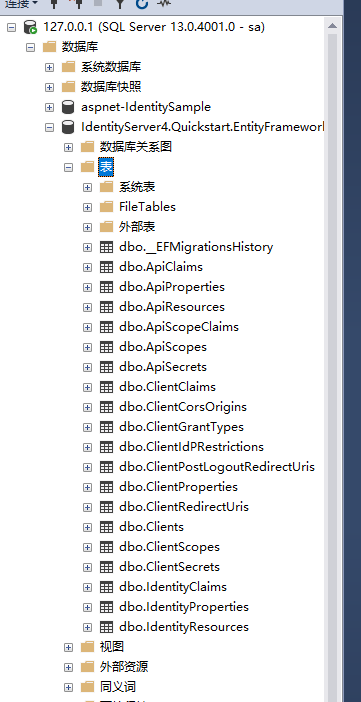
初始化数据
在Startup.cs中添加此方法以帮助初始化数据库:
private void InitializeDatabase(IApplicationBuilder app)
{
using (var serviceScope = app.ApplicationServices.GetService<IServiceScopeFactory>().CreateScope())
{
serviceScope.ServiceProvider.GetRequiredService<PersistedGrantDbContext>().Database.Migrate(); var context = serviceScope.ServiceProvider.GetRequiredService<ConfigurationDbContext>();
context.Database.Migrate();
if (!context.Clients.Any())
{
foreach (var client in Config.GetClients())
{
context.Clients.Add(client.ToEntity());
}
context.SaveChanges();
} if (!context.IdentityResources.Any())
{
foreach (var resource in Config.GetIdentityResources())
{
context.IdentityResources.Add(resource.ToEntity());
}
context.SaveChanges();
} if (!context.ApiResources.Any())
{
foreach (var resource in Config.GetApiResources())
{
context.ApiResources.Add(resource.ToEntity());
}
context.SaveChanges();
}
}
}
然后我们可以从 Configure 方法中调用它:
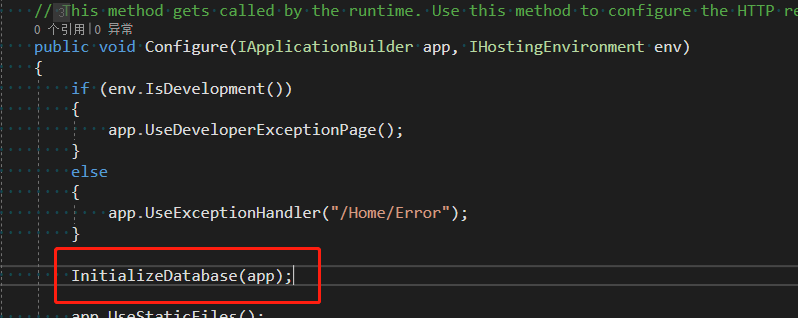
然后运行,我们可以看到在 Clients 表中已经有了数据

源码:链接: https://pan.baidu.com/s/1BauxqrclWtlOJk9h6uxtAg 提取码: dq4e
【ASP.NET Core分布式项目实战】(三)整理IdentityServer4 MVC授权、Consent功能实现的更多相关文章
- ASP.NET Core分布式项目实战
ASP.NET Core开发者成长路线图 asp.net core 官方文档 https://docs.microsoft.com/zh-cn/aspnet/core/getting-started/ ...
- 【笔记目录2】ASP.NET Core分布式项目实战
当前标签: ASP.NET Core分布式项目实战 共2页: 上一页 1 2 11.ClientCredential模式总结 GASA 2019-03-11 12:59 阅读:26 评论:0 10. ...
- 【笔记目录1】ASP.NET Core分布式项目实战
当前标签: ASP.NET Core分布式项目实战 共2页: 1 2 下一页 35.Docker安装Mysql挂载Host Volume GASA 2019-06-20 22:02 阅读:51 评论 ...
- ASP.NET Core分布式项目实战-目录
前言 今年是2018年,发现已经有4年没有写博客了,在这4年的时光里,接触了很多的.NET技术,自己的技术也得到很大的进步.在这段时光里面很感谢张队长以及其他开发者一直对.NET Core开源社区做出 ...
- 【ASP.NET Core分布式项目实战】(一)IdentityServer4登录中心、oauth密码模式identity server4实现
本博客根据http://video.jessetalk.cn/my/course/5视频整理 资料 OAuth2 流程:http://www.ruanyifeng.com/blog/2014/05/o ...
- 【ASP.NET Core分布式项目实战】(二)oauth2 + oidc 实现 server部分
本博客根据http://video.jessetalk.cn/my/course/5视频整理(内容可能会有部分,推荐看源视频学习) 资料 我们基于之前的MvcCookieAuthSample来做开发 ...
- 【ASP.NET Core分布式项目实战】(五)Docker制作dotnet core控制台程序镜像
Docker制作dotnet core控制台程序镜像 基于dotnet SDK 新建控制台程序 mkdir /home/console cd /home/console dotnet new cons ...
- 【ASP.NET Core分布式项目实战】(六)Gitlab安装
Gitlab GitLab是由GitLabInc.开发,使用MIT许可证的基于网络的Git仓库管理工具,且具有wiki和issue跟踪功能.使用Git作为代码管理工具,并在此基础上搭建起来的web服务 ...
- 【ASP.NET Core分布式项目实战】(四)使用mysql/mysql-server安装mysql
Docker安装Mysql 拉取镜像 docker pull mysql/mysql-server 运行mysql docker run -d -p : --name mysql01 mysql/my ...
随机推荐
- 翻译:Identifier Qualifiers标识限定符
*/ .hljs { display: block; overflow-x: auto; padding: 0.5em; color: #333; background: #f8f8f8; } .hl ...
- Natas Wargame Level27 Writeup(SQL表的注入/溢出与截取)
前端: <html> <head> <!-- This stuff in the header has nothing to do with the level --&g ...
- Android开发——diglog cancel与dismiss方法区别
AlertDialog dismiss 和 cancel方法的区别 AlertDialog使用很方便,但是有一个问题就是:dismiss方法和cancel方法到底有什么不同? 今天有时间,看了看源 ...
- HttpClient4.5 post请求xml到服务器
1.加入HttpClient4.5和junit依赖包 <dependencies> <dependency> <groupId>org.apache.httpcom ...
- ArcGIS Runtime SDK是什么?
如上图,Runtime SDK是什么东西?居然还有安卓.苹果手机.Mac.QT的版本? 是不是意味着ArcGIS的编辑数据和空间分析可以通过编程的方法在每个平台上满地跑了? 答案是:是,也不是. 1. ...
- Cat 跨线程之 ForkedTransaction 用法和原理分析
代码 package com.dianping.cat.message.internal; import com.dianping.cat.Cat; import com.dianping.cat.m ...
- date 命令详解
date - print or set the system date and time Display the current time in the given FORMAT, or set th ...
- JMeter 插件管理
JMeter管理的插件包括了jmeter-plugins.org上常用的插件以及各种第三方插件和JMeter核心插件. JMeter插件管理器主要管理插件安装,卸载,升级等操作. 安装插件管理 1.下 ...
- Android SDK Manager配置
Android SDK Manager就是一个Android软件开发工具包管理器,就像一个桥梁,连通本地和服务器,从服务器下载安卓开发所需工具到本地. 而AVD Manager是一个Android虚拟 ...
- Disruptor并发框架(一)简介&上手demo
框架简介 Martin Fowler在自己网站上写了一篇LMAX架构的文章,在文章中他介绍了LMAX是一种新型零售金融交易平台,它能够以很低的延迟产生大量交易.这个系统是建立在JVM平台上,其核心是一 ...
